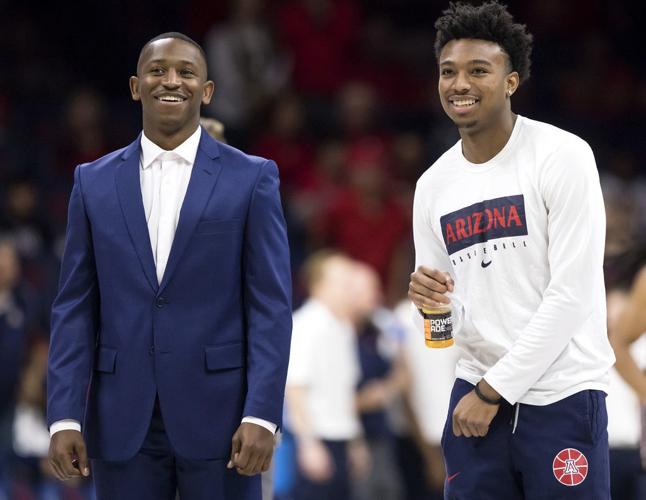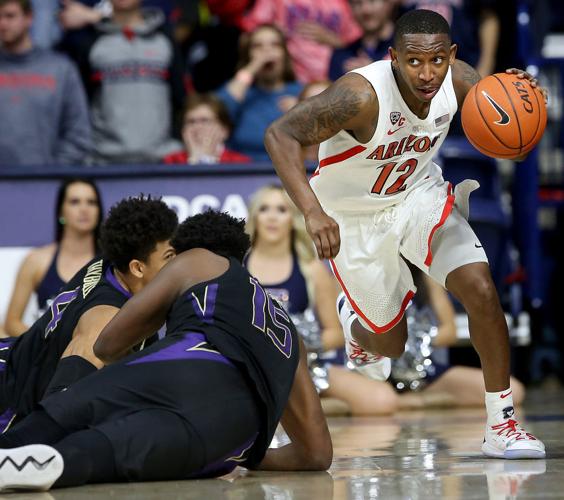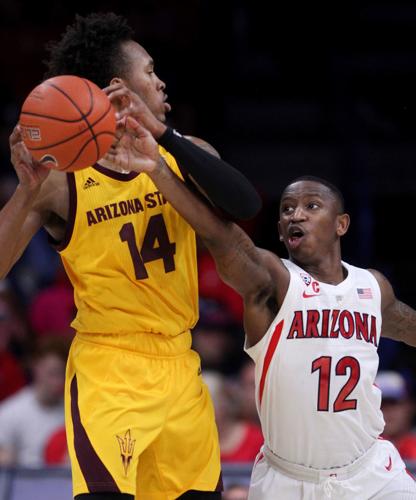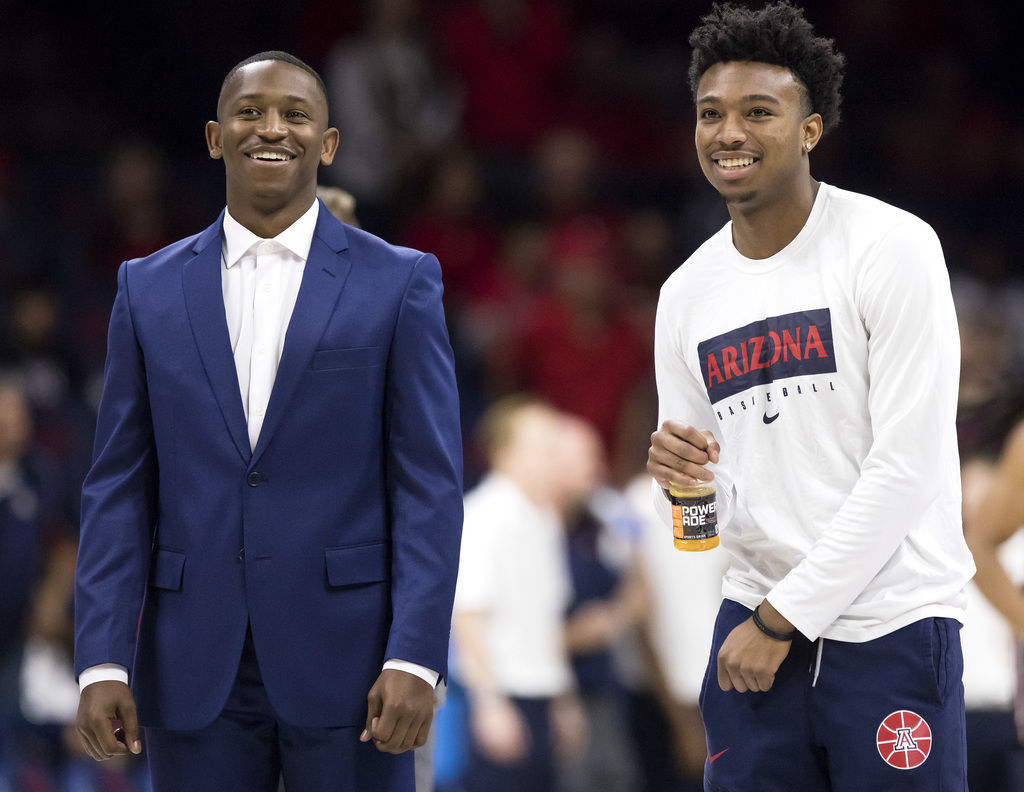Once he moved into a graduate manager role for the Arizona Wildcats last season, Justin Coleman finally hit an obstacle on the floor that he couldn’t get past.
NCAA rules meant he wasn’t allowed to coach his former teammates. Couldn’t practice on the scout team. Just rebound for guys, carry out other manager duties and help coaches with their scouting reports behind the scenes.
“My duties were to help set up practice and assist the coaches in the best way I could,” Coleman says.
As the Wildcats’ point guard in 2018-19 following a grad transfer from Samford, Coleman often faced a different obstacle. But pain never really stopped him.
“I learned about his pain tolerance very quickly when he arrived on campus,” UA athletic trainer Justin Kokoskie said. At one point “he suffered a significant hip flexor strain. I’ve had players in the past miss three to four weeks with the same injury. Because it was preseason, I forced him to be careful for a week, but he wanted no part of it.”
Same thing happened, with much more on the line, just before the Wildcats opened Pac-12 play.
Already having been named co-captain — and putting up a 28-point monster game against Gonzaga that helped lead to a spot on the Maui Invitational all-tournament team — Coleman dislocated his left shoulder during a New Year’s Eve day practice, then tried to shake it off as Kokoskie reduced the dislocation.
“I could tell how painful it was as he was trying not show it to me,” Kokoskie said. “Many athletes would have been out 4-6 weeks, but he refused to miss any time.”
Coleman didn’t miss a single game. Four days later, he played only four minutes against Colorado but dished two assists before leaving the floor. UA coach Sean Miller said after that game that the staff initially didn’t know how bad the dislocation was but opted to play him because he wasn’t at risk for further injury.
That didn’t mean it would get better, though.
Two days later, Coleman played 33 minutes against Utah, but shot 1 for 8 and, exactly a week after the Colorado game, was seen crouching in agony, grabbing his left shoulder in a game at Stanford … when he still managed to play 39 of 40 minutes.
It went on that way pretty much the rest of the season. Coleman averaged 34.0 minutes in UA’s 17 conference games after the opener against Colorado, averaging 8.3 points and 4.2 assists no matter what was going on.

Former Arizona guard Justin Coleman is working toward a dissertation in mental health and sports, and would like to get into real estate or coaching down the road.
“I think he downplayed the daily soreness to me because he did not want to miss any time and did not want me limiting him in any way,” Kokoskie said. “It was quite impressive as I rarely see kids able to fight through that much pain to help his team in whatever way he could. He was the ultimate team-first guy. Very few guys are wired that way these days.”
Typically, when asked about the injury’s lingering effects last month, Coleman mostly shrugged it off.
“The thing I can say is when you play a sport with other players you kind of get selfless to a point where it’s not about myself,” Coleman said.
“At that point I only had half a season to go, and it wasn’t about me — it’s about playing for the other guys that were wearing the same jersey as me.
“So when I talk about pain, yeah, I was in pain, but that was the least of my concerns. My concern was to just be as healthy as I could and just give all I had.”
Coleman had plenty of highlights the rest of the way, helping compensate for the sudden loss of Brandon Williams with 19 points and nine rebounds at Arizona State in late January, but that game became the third of a seven-game losing streak, and the Wildcats finished their 17-15 season in the first round of the Pac-12 Tournament.
Afterward, Coleman was offered the chance to stay on as a graduate manager, giving him the chance to transition into coaching and pursue a doctorate in Educational Leadership at the same time.
Already having finished a master’s degree in the same subject last summer, Coleman said he is now doing research toward an eventual dissertation in mental health and sports with an eye on eventually digging into real estate or coaching.
His days are absorbed in both pursuits.
“I would try to get to the office as early as possible, spend an hour from 8-9 doing homework and the rest of my hours would be toward film, learning how to increase my skills get better as far as using a laptop and breaking down clips,” Coleman said. “It could just be anything, breaking down film with the coaches or actually sitting there watching the film with the coaches, and they are asking me my input (having been) a player, or how would I do this differently.”
Coleman had an interesting perspective to offer. Unlike the coaches, he had actually played against many of the same Pac-12 players the Wildcats were facing this season, though Coleman downplayed the comparisons.
“Every year a team is different because you add different pieces and players to a program,” Coleman said. “So the Colorado that I played against is a totally different team than I (faced as a manager). Often the schemes and game plans change.”
Although Coleman was neither able to tutor the Wildcats on the floor nor go head-to-head with Nico Mannion at the point, he was able to relate to the highly regarded freshman last season in one way: Mannion suffered a back injury at the Wooden Legacy event over Thanksgiving week that appeared to sap his confidence.
“The first thing I want to say is that I’m very proud of Nico Mannion,” Coleman said. “I look at him as a little brother of mine, and he had a great season. The thing is he had to battle, he had to fill some big shoes at the point guard spot. He handled his business, and that’s one thing I can definitely commend him on.”

Arizona Wildcats guard Justin Coleman (12) picks the pocket of Arizona State Sun Devils forward Kimani Lawrence (14) during the first half of the University of Arizona Wildcats vs. Arizona State University Sun Devils men’s college basketball game, March 9, 2019, in McKale Center in Tucson, Ariz.
While Mannion will head to the NBA draft this summer, Coleman said he will return for another year as graduate manager, content with a transition to coaching and what he says could be four or five years of Ph.D. research.
Ironically, while he’s now pain-free, Coleman doesn’t itch to play anymore.
Then again, maybe that’s fitting.
Because the pain never mattered anyway.
“I’ve had no desires to play,” Coleman said. “The day I decided not to play, I was a little worried that I would, but I haven’t actually. I’ve enjoyed every single thing I’ve been doing so far.”







